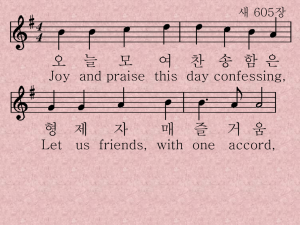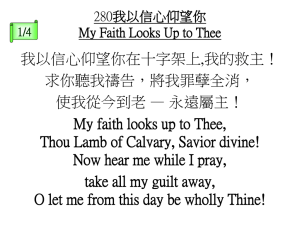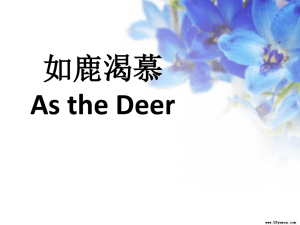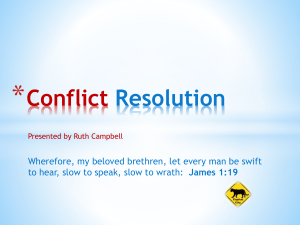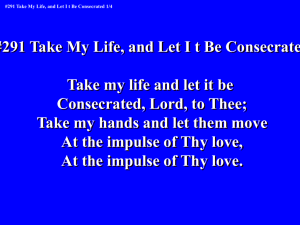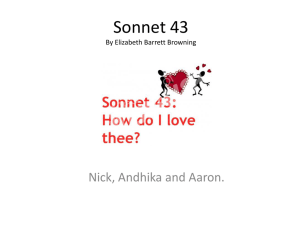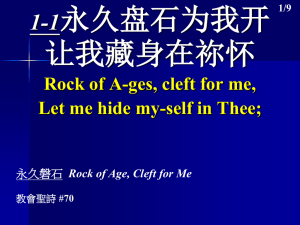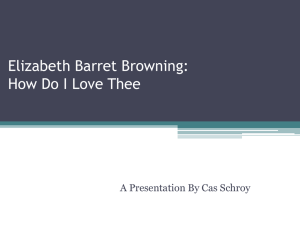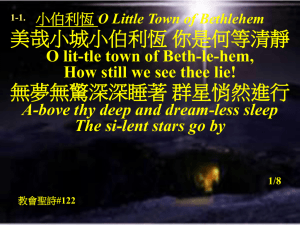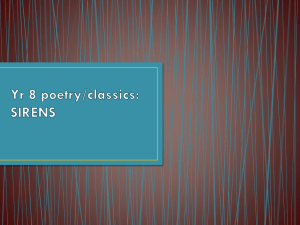第四课
advertisement
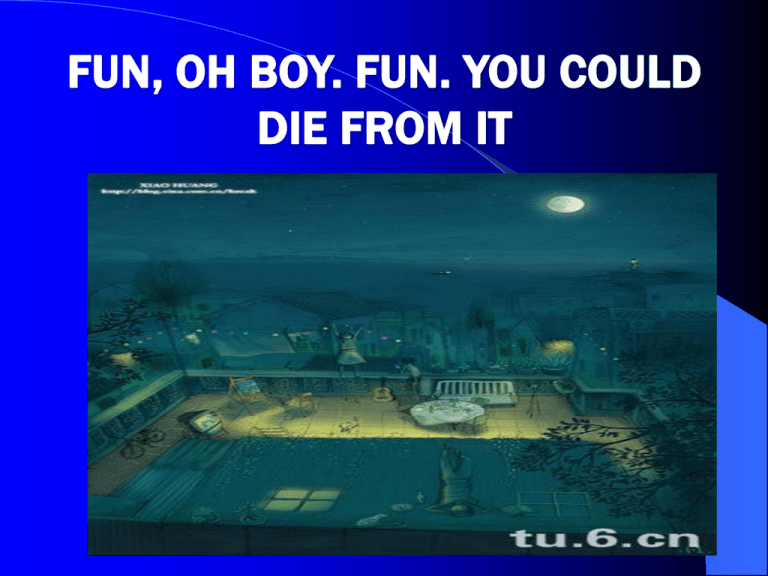
Warm-up Activity How Do I Love Thee? How do I love thee? Let me count the ways. I love thee to the depth and breadth and height My soul can reach, when feeling out of sight For the ends of Being and ideal Grace. I love thee to the level of every day's Most quiet need, by sun and candlelight. I love thee freely, as men strive for Right; I love thee purely, as they turn from Praise. I love with a passion put to use In my old griefs, and with my childhood's faith. I love thee with a love I seemed to lose With my lost saints, I love thee with the breath, Smiles, tears, of all my life! and, if God choose, I shall but love thee better after death. 我是怎样的爱你?诉不尽万语千言: 我爱你的程度是那样地高深和广远, 恰似我的灵魂曾飞到了九天与黄泉, 去探索人生的奥妙,和神灵的恩典。 无论是白昼还是夜晚,我爱你不息, 像我每日必需的摄生食物不能间断。 我纯洁地爱你,不为奉承吹捧迷惑, 我勇敢地爱你,如同为正义而奋争! 爱你,以昔日的剧痛和童年的忠诚, 爱你,以眼泪、笑声及全部的生命。 要是没有你,我的心就失去了圣贤, 要是没有你,我的心就失去了激情。 假如上帝愿意,请为我作主和见证: 在我死后,我必将爱你更深,更深! Pre-reading questions + 1. Do you believe you’re having fun in your life? 2.Do you think it is easy to have fun? Why? Words and Expressions 1.damper n.sth.that stops an occasion from being as enjoyable as it was intended to be Eg. Her very presence placed something of a damper on the conversation-in much the same way as it had at school. 有她在场,谈话往往会变得扫兴, 这一点仍然象她在中学时那样。 His absence put a bit of a damper on the party. 他的缺席使宴会有点不尽人意。 2. fetish n. sth. regarded with extravagant trust or respect Eg. Mary makes a fetish of her home; she's always cleaning it. 玛丽太看重她的房子了, 她老是不停地打扫。 Some young people like to make a fetish of style. 有些年轻人喜欢盲目地赶 时髦。 3.overshadow v. make insignificant by comparison;dominate Eg. Her new book will overshadow all her earlier ones. 她的新书将会使她以前写的书都黯然失色。 Large oak trees overshadow the garden. 高大的栎树把花园遮得很暗. Back 4.reverently ad.with a feeling of respect and admiration Eg. I put the book reverently back in its place. 我恭恭敬敬地把这本书放回 原处。 They all reverently bowed their heads and hearts. 全家人都虔诚地低下了头, 在心里致敬。 上一页 Back . 上一页 下一页 +The essay evaluates the “fun” side of the American culture in an ironic way. The first five paragraphs, which form the introduction to the essay, provide a stipulative definition of “fun”. Then in the main body of the text, the writer gives an extended definition of it by pointing out what it is not. The essay concludes with an anecdote that further explains what fun is. To develop the definition, a number of methods have been employed, among which are narration., comparison and contrast. Text Structure Part I (paras. 1-5) Introductory part about the understanding of fun. Part II (paras. 6-11) In this part, the writer offers an extended definition of the word “fun” by negation. Part III (paras. 12-15) The author explains his opinion about fun by some detailed examples. Main Idea of the Text In the text, the author tries to explain some misunderstanding about fun in an ironic way by some detailed examples. Phrase Paraphrasing + 1. I examined my contract and pointed out a minor discrepancy in it. drew attention to 2.The Defense Secretary was pressed to elaborate on UN policy in Bosnia. +fully explain +3.They had sworn to back up the president no matter how shady or understand hie dealings with foreign powers were. +support Sentence Paraphrasing 1.Somewhere along the line people got the modern idea that fun was there for the asking,that people deserved fun,that if we didn’have a little fun every day we would turn into(sakes alive!)puritans. . +Nowdays,people believe that they can have fun whenever they want it,and that they should have fun;otherwise they would be leading a dull and bitter life as a puriton. +2.The god of mirth is paying us back for all those years of thinking fun was everywhere by refusing to come to our party. +We have long assumed that fun was esay to have, but now we are paying a price for that shallowmindedness,i.e,our party is hardly as much fun as it is expected to be. Sentence Translation 1.“Was it fun?”became the question that overshadowed all other questions:good questions like:Was it fun? Was it kin?Was it honest? Was it beneficial?Was it generous? Was it nacessary?And (m selfley favorite)was it selfless? +“有趣吗?”这一问题使所有其他问题黯然失色,比 如: +“道德吗?”“仁慈吗?”“诚实吗?”“有益吗?” +“慷慨吗?”“有必要吗?”和(我最喜欢的)“无 私吗?” +等一些有意义的问题。 2.When the pleasure got to be the main thing,the fun fetish was sure to follow. +当乐趣成为生活中的主要内容时,随之而来必定是 对乐趣的迷恋崇拜。 +3.It occurred to me,while I was sitting around waiting for the fun to start,that not much is,and that I should tell you just in case you’re worried about your fun capacity. +在坐待乐趣来临的时候,我发现其实并没有多少乐 趣可言,我的告诉你们这一点,免得你们还担心自 己无力消受。 Grammatical Point +What 与that引导名词性从句时的区别 两者均可引导主语、表语、宾语从句, 区别是 what 可在从句中用作主语、宾 语或表语,意为“什么”或“所… 的”,而 that 仅起连接作用,本身没 有实际意义,在从句中也不充当任何 句子成分(引导宾语从句时通常可以省 略)。另外,that 可引导同位语从句, 但 what 通常不用于引导同位语从句。 Exercises 1.He doesn’t know what she likes. 他不知道她喜欢什么。 2. What you say is quite right. 你所说的相当正确。 3. I believe (that) he will come to see us. 我相信他会来看我们的。 4. It’s a pity (that) he didn’t finish college. 真遗憾他大学没毕业。 5. I had no idea that you were here. 我不知道你在这儿。 Writing practice Write a 200-word composition on the topic “On Gay Marriage”. In the first part of your composition, showing your own opinion about this question. In the second part, showing some arguments about your opinion. In the last part, giving a conclusion of the whole composition.
